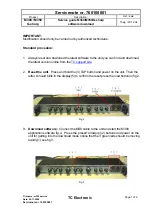
SROS Command Line Interface Reference Guide
Global Configuration Mode Command Set
5991-2114
© Copyright 2007 Hewlett-Packard Development Company, L.P.
428
nat source list
policy class entry or implicitly discarded if no further policy class entries exist.
(continued)
Possible
nat source list
actions performed by the access policy are as follows:
nat source list
<access control list name>
address
<IP address>
overload
nat source list
<access control list name>
address
<IP address>
policy
<access policy name>
nat source list
<access control list name>
interface
<interface>
overload
nat source list
<access control list name>
interface
<interface>
policy
<access policy name>
address
<IP address>
The
address
keyword specifies the IP address from which the translated packets
will be sourced.
interface
<interface>
The primary IP address of an interface is used as the source IP for translated
packets when the
interface
keyword is applied.
policy
<access policy name>
When the
policy
<access policy name>
is specified, the firewall attempts to
match the specified access policy with the access policy that is applied to the
packet's egress interface as determined by the routing table or policy-based
routing configuration. If there is a match, the firewall will process the packet. If
there is no match, the firewall will process the packet based on the next policy
class entry or implicitly discard it if no further policy class entries exist.
overload
The
overload
command is not optional and must be used when using the
nat
source list
command.
nat destination list
All packets permitted by the specified extended ACL entering the interface that
the policy class is assigned to will translate the destination IP address of the
packet to the specified
address
and an association will be created in the firewall.
All associations created by the
nat destination list
are subject to the built-in
ip policy-timeout <protocol> <range> <port>
on page 433). All packets denied by the extended ACL will be
processed by the next policy class entry or implicitly discarded if no further policy
class entries exist. Possible
nat destination list
actions performed by the access
policy are as follows:
nat destination list
<extended access control list name>
address
<IP address>
port
<port number>
address
<IP address>
The
address
keyword specifies the private IP host to which the translated packets
are destined.
port
<port number>
The
port
keyword is used to translate the original destination port to a
user-specified port.
















































